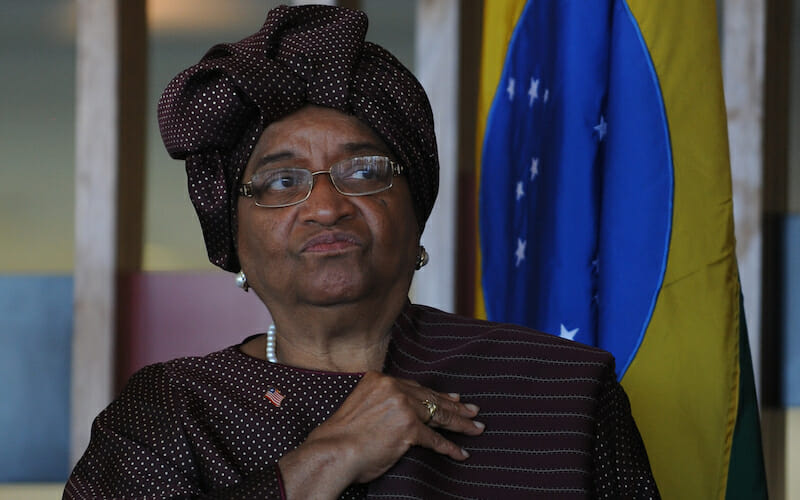
Liberia Undergoes Two Historic Shifts
Overshadowed by coverage of Liberia’s general elections this month was the news that the UN’s peacekeeping mission (UNMIL) is withdrawing its forces after nearly 15 years on the ground. If all goes as planned, the last troops will leave by April. The development, which comes a little more than a year after UNMIL officially handed over security responsibilities to the government, marks a critical shift for Liberia. Although the country and its outgoing president, Ellen Johnson Sirleaf, have been applauded for maintaining stability in the aftermath of the bloody civil war that ended in 2003, they have done so with the help of roughly 15,000 peacekeepers at any given time.
Now, it is an open question whether the new president, who will be selected in a run-off in November, will be able to continue keeping the peace – and address the country’s other myriad challenges – without their assistance.
After all, Johnson Sirleaf herself, who received the Nobel Peace Prize for her role returning peace to Liberia, has repeatedly acknowledged the key contributions UNMIL made towards her country’s recovery. In her last speech to the UN General Assembly in September, she went over the successes of her tenure, adding that none of it would have been possible without the assistance of UNMIL.
Indeed, UNMIL acted as a critical stopgap force as Liberia patched itself up after the brutal four-year civil war. During the initial rebuilding period, the mission helped fill holes that the government could not, acting as de facto military and police forces and providing basic services. The UN troops supported preparations for the first postwar election and assisted Johnson Sirleaf’s administration as it got on its feet after 2005 elections. Their success was bolstered by the fact that after two grueling civil wars, Liberians were ready for peace, and Johnson Sirleaf was eager to unify the country again.
Of course, UNMIL was not perfect. Following a 2015 investigation, a number of peacekeepers were accused of buying sex and engaging in other forms of misconduct, part of an epidemic of sexual abuse among UN troops stationed around the world. The forces were also the subject of criticism for their failure to adequately reintegrate former militants as part of the country’s disarmament and rebuilding process.
Nevertheless, it is arguable that the mere presence of UNMIL was psychologically and societally valuable as the country began patching itself back together in the aftermath of the civil strife.
Now, although fears have diminished that Liberia will dissolve back into full-blown war, these fears may well reemerge depending on who wins the presidential run-off votes – especially amidst concerns of voter fraud and other irregularities.
Indeed, the run-up to the first round in the general elections was already marked by rampant vote buying and handouts of food, cash, and other goodies to prospective voters. For instance, presidential candidate Oscar Cooper was videotaped handing out cash to Liberians in a move that surprised no one.
Now, George Weah is set to face a run-off for the presidency after having won 38.4% of the votes in October 10th, 10 points more than vice president Joseph Boakai, but not enough to clinch an absolute majority.
Weah is a former football star and Africa’s only Ballon d’Or winner who turned to public service after retiring from sport in 2003. He has since acted as a UNICEF Goodwill Ambassador for his work on behalf of former child soldiers and has served as a senator for the Congress for Democratic Change since 2015. Running on a platform of combatting corruption and improving the economy, he enjoys high levels of popularity among Liberia’s youth, who feel that they have missed out on most of the benefits from the country’s ongoing recovery.
It is relatively easy to see why Weah has the lead, given Boakai’s mediocre record in government as outgoing vice president. While his boss, Johnson Sirleaf, received plaudits for her role in returning Liberia to peace, the government’s record in other sectors – notably rule of law, economy, and infrastructure – left much to be desired. Following a slump in prices for iron ore, Liberia’s top source of foreign currency, the country recorded no economic growth between 2014 and 2016. Corruption is rampant, access to electricity and clean drinking water remains patchy, and remittances make up nearly a third of GDP, the highest rate on the continent.
A Weah win would be a welcome change and would satisfy Liberians’ desire for change. It would also mark the country’s first peaceful democratic power transfer in 73 years, an even more powerful symbol in the wake of UNMIL’s withdrawal. That mere fact alone is a sign of how far the country has progressed from the dark days of its civil war, a mere 14 years ago.
